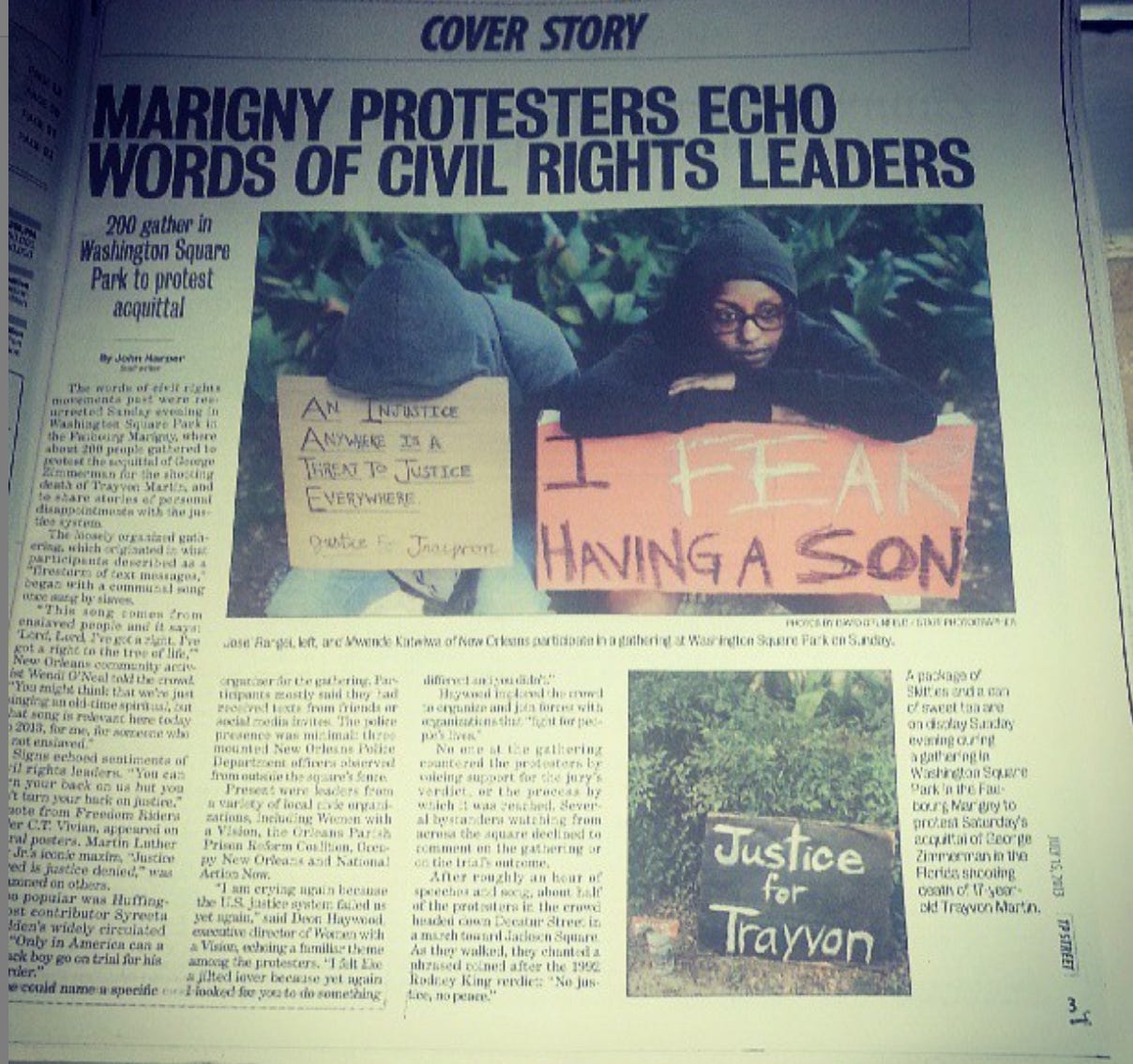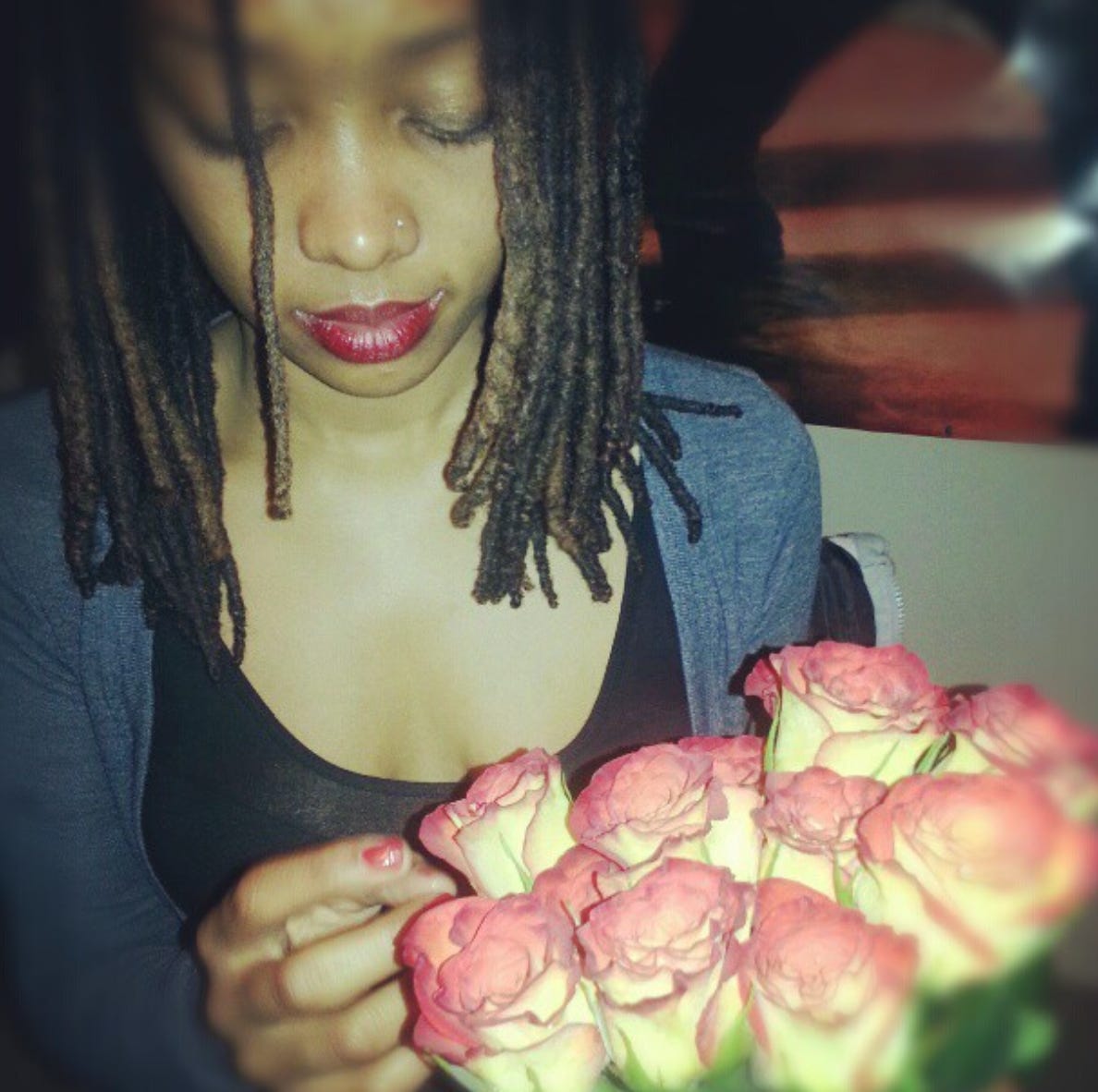Written by: Allison Gaines
Dating a rapper is like dating a daydreamer because they always seem to get lost in the clouds, imagining a life for themselves so much different from what they had. Writers have that in common with rappers, always shifting the narrative in a perpetual cycle of creating and sharing. Maybe that’s why I found Jackie’s lyrical talents so refreshing.
I enjoyed listening to him freestyle as I wrote poems deep into the night. He seemed head over heels for me which seemed wholly different from the relationships I had in the past, where I felt I put in way more effort than my romantic partners.
Our relationship had layers, transcending the confines of hip-hop. In the months after Trayvon Martin’s death, Jackie and I attended rallies together, organizing, and getting to know other local activists. We wore hoodies and marched in the streets till our voices grew course. Some folks complained that marching never changed anything, but I always felt better doing something rather than nothing. Jackie and I had that in common—we cared for more than just ourselves. Our protest in the Marigny made the news. To that Jackie said, “So proud of our people.” We shared that sentiment. It was not just about winning for me but having the will to fight.
Sometimes New Orleans feels too small for dreamers like us, where it’s easy to feel like a big fish in a small pond. I know I felt that way before, which is why I traveled to Austin, Chicago, and Los Angelos. But I always returned home, the crescent city, where smiles came to a dime a dozen. Before leaving for Chicago a few years back, I got a black and gold fleur-de-lis tattooed on my left arm. This is the symbol of my city and it was my way of saying that if anything ever happened to me, I’d like to be returned home, where I feel I belong.
Still, traveling became a much-needed escape. And as a young woman, I was so interested in these big cities outside of the South. Jackie felt the same big-fish-small-pond energy that led us to travel to New York City. It doesn’t get much bigger than this, I thought to myself as we arrived at 42nd Street terminal. All the rumors were true—New Yorkers were rude. No one stopped and said hello, smiled, or made much eye contact.
As I moved alongside the opening of the subway, holding a large suitcase, a White woman brushed past me, nearly knocking me down. I shoved her, regaining my balance, and getting oriented to the culture shift. The woman seemed such in a hurry that she could have killed me. I felt startled by her nonchalance. “Jackie,” I said, “we are not in Kansas anymore.” He laughed, holding my hand, promising not to let me fall.
As I exited the subway, the weather felt frosty, so much different from the humid weather down South. Even though I was wearing jeans, a long-sleeve shirt, and a jacket, the cold seemed to pierce through my clothes. I wondered how or why people would live this far North, and felt really bad for a homeless man I saw. The idea of having nowhere to live in such a harsh climate seemed devastating.
When we first arrived, we stayed with his friends, connections from the industry. Jackie had traveled to New York as a teenager so this wasn’t his first rodeo, but it was mine. During our first days, I made groceries, enjoying the small markets that seemed to dot the landscape. They had no file, so I couldn’t make gumbo. Their spices smelled different. Back home, our spices seemed to belong together, one building upon the last, creating a distinct creole taste. But up here, everyone was doing their own thing. They lived side-by-side but didn’t share the culture we did. At least I couldn’t see it from the outside looking in.
I stumbled into a Russian bakery but seemed puzzled by the options. Sure, things looked good but nothing looked familiar, so I left. When I made it back, Jackie said, “I’m going to the studio. Make yourself at home.” So I did, happy to escape the weather. Once I cooked for his friends, they seemed happy to welcome us into the fold. Over the next few weeks, Jackie began working as a bread baker—hip hop didn’t pay the bills—and I found work as a bartender, falling into my old trade.
But finding these jobs was difficult since some of the advertisers said you needed 2+ years of New York Restaurant experience. That really irked me because back home, where we hosted Mardi Gras, we definitely knew how to deal with high volume. Each year, over a million people come to the city and they all want to eat. It doesn’t get any busier than having a line around the block. But, I digress. There was a snobbiness about the North I didn’t care for. l seemed to like the idea of New York which was a combo of Sex and the City and Futurama, more than the actual city.
Already, I missed my friends and family so much. My dad came to visit me, driving all the way from Lafayette. He introduced himself to the local shop owners. Like me, he seemed to expect a level of kindness that did not exist here. He thought that if he spent money there, and introduced me as his daughter, they would look out for me. I knew they didn’t care, but I let him go on and on because I loved watching him interact with people.
My dad didn’t like Jackie. To him, he seemed unstable, something I was too head over heels to notice yet. I took my dad on a trip to Harlem where we walked around for hours. Then it started to snow and we both shared a look. It’s not often Southerners see snow, and certainly not the type that stays snow once it hits the ground. It’s time to go home, I told him. But my dad wasn’t ready to call it a night, claiming he would “walk back” to Brooklyn without us. I laughed and knew he wanted some time alone, so we left.
I felt so happy that my dad traveled so far to see me, that I was that important to him that he would travel heaven and Earth to get to me. My dad is far from perfect but he has a warm spirit that he passed on to me, which makes us friendly, and very extroverted. We wear our hearts on our sleeves and then curse the world for breaking them.
We stayed near Kingston Throop in an area filled with Black businesses. There was a different ideology up here, one that supported Black independence. Down South, I never saw so many places owned by people who weren’t White. Many restaurants had signs which said “no pork on my fork,” which jived right with my eating habits. How odd to be so far away from home and find liked-minded people living in an area that seemed like a cultural desert to me.
Jackie seemed happy but distant. He seemed to be always in the studio or attending late-night jam sessions with his newfound friends. I was alone a lot. I remember sitting by my window looking outside as the snow seemed neverending. It was almost New Year’s Eve and I was sick. Years before, I caught bronchitis and it was back. I felt a heaviness in my lungs and a quick trip to urgent care confirmed it. As I walked back, I passed a bunch of Jewish people near a school. They all wore black and white and even though we had a Jewish Community center, I never saw them wearing traditional clothing before. The scene looked beautiful and serene.
The snow seemed to come down harder and as the sun waned, it grew much colder. I slipped and fell in the layers of slush, ice, and snow and to my surprise, none of the Jewish men helped me up. They didn’t laugh either but they stared. Helping a Black woman who fell was completely out of the question, so I picked myself up, recovered from my shock, and headed back.
Once I made it to the apartment, I drank soup and waited. But Jackie never made it home that night. Neither did our newfound roommates. No one even called me. It was then that I started to reconsider this whole New York adventure, that landed me sick, far away from home, lonely, and invisible. Maybe this relationship was too new to take on the road, maybe I wasn’t made for New York, and maybe it wasn’t so bad being a big fish in a small pond, I began to wonder.
I wore two pairs of jeans, still not knowing how to stay warm, and sat on the front steps. A woman across the street asked, “why are you sitting there?” At that point, I felt fed up. What was wrong with these people, I thought. Why does it matter where I sit, especially since I’m living right there. I treated her question as if it were rhetorical and started to roll a cigarette from a pack I bought.
Then, a police officer pulled up and put on his siren. He said, “what you got there?” I rolled my eyes because even though I smoked weed, I was not doing it here, outside, in broad daylight. I told him the truth, “I’m rolling a cigarette. Want one?” My sarcasm made him laugh. It could have easily gone in the other direction but I felt too sick to care one way or the other. They drove off and I went back inside moments later. The cops seemed so thirsty to find me doing something wrong. They wouldn’t have hassled a White woman in the same way, I thought.
When Jackie came home the next day, I didn’t have the energy to argue. But as one night turned into many, I did confront him about his frequent disappearances. He told me he was participating in some rap battles and got lost in time, meeting people, and making connections. I didn’t trust him but I got lost in the day-to-day of it all and stayed until we had a big argument on the rooftop of the building we stayed in. His mood seemed to shift from kind and bubbly, to condescending when we discussed our relationship. “You knew what you were getting yourself into, dating a rapper. What did you expect?” As I tried to hug him, he grabbed me, and as I looked below, I felt afraid for the first time, alone with him. Why do guys wait so long to show you this side, I thought.
But in a way, Jackie was right. I dated rappers in the past and certainly had some poor experiences to show for it. Hadn’t I learned anything? I guess not because deep down, I was a hopeless romantic. Despite what the past showed me, I wanted to believe there was more love out there for someone like me. Despite everything, I felt it was perfectly natural to want more.
After all, I was born to be more than eye-candy, sitting near the stage clapping for a man’s self-expression. I had dreams too. I remembered the late-night, Jet Lounge run-ins I had with Currency. Even though we never dated, he seemed more than happy to watch me fumble through lyrics on stage. And I felt that someone I dated should show me at least that much support.
I decided to leave New York. There wasn’t enough kindness or love here for me, at least from an outsiders’ perspective. I will always remember these days fondly, laughing at New Orleanians who call fifty degrees cold. Big fish, small pond? Maybe that wasn’t so bad after all.






